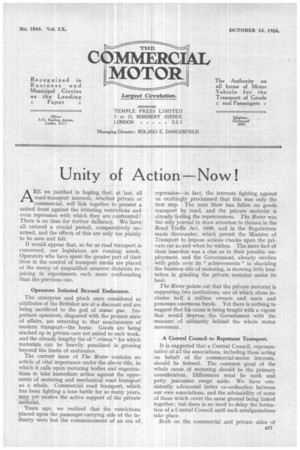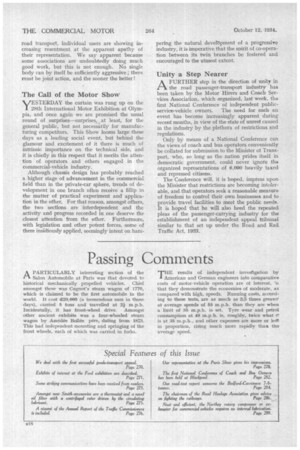Unity of Action Now !
Page 35

Page 36

If you've noticed an error in this article please click here to report it so we can fix it.
ARE we justified in hoping that, at last, all road-transport interests, whether private or commercial, will link together to present a united front against the irritating restrictions and even repression with which they are confronted? There is no time for further dalliance. We have all entered a crucial period, comparatively unarmed, and the effects of this are only too plainly to be seen and felt.
It would appear that, so far as road transport is concerned, our legislators are running amok. Operators who have spent the greater part of their lives in the control of transport media are placed at the mercy of unqualified amateur dictators rejoicing in experiments each more confounding than the previous one.
Operators Irritated Beyond Endurance.
The enterprise and pluck once considered as attributes of the Britisher are at a discount and are being sacrificed to the god of status quo. Important operators, disgusted with the present state of affairs, are returning to that anachronism of modern transport—the horse. Goods are being stacked up in Ovate cars not suited to such work, and the already lengthy list of " crimes" for which motorists can be heavily penalized is growing beyond the limits of endurance.
The current issue of The Motor contains an article of vital importance under the above title, in which it calls upon motoring bodies and organizations to take immediate action against the opponents of motoring and mechanical road transport as a whole. Commercial road transport, which has been fighting a lone battle for so many years, may yet receive the active support of the private motorist.
Years ago, we realized that the restrictions placed upon the passenger-carrying side of the industry were but the commencement of an era of. repression—in fact, the interests fighting against us exultingly proclaimed that this was only the first step. The next blow has fallen on goods transport by road, and the private motorist is already feeling the repercussions. The Motor was the only journal to draw attention to clauses in the Road Traffic Act, 1930, and in the Regulations made thereunder, which permit the Minister of Transport to impose serious checks upon the private car as and when he wishes. The mere fact of their insertion was a clue as to their possible employment, and the Government, already swollen with pride over its " achievements " in shackling the business side of motoring, is showing little hesitation in grinding the private motorist under its heel.
The Motor points out that the private motorist is supporting two institutions, one of which alone includes half a million owners and users and possesses enormous funds. Yet there is nothing to suggest that his cause is being fought with a vigour that would impress the Government with the measure of solidarity behind the whole motor movement.
A Central Council to Represent Transport.
It is suggested that a Central Council, representative of all the associations, including those acting on behalf of the commercial-motor interests, should be formed. The common good of the whole cause of motoring should be the primary consideration. Differences must be sunk and petty jealousies swept aside. We have consistently advocated better co-ordination between our own associations, and the advisability of some of those which cover the same ground being linked together ; but there is no need to delay the formation of a Central Council until such amalgamations take place.
Both on the commercial and private sides of Br/ road transport, individual users are showing increasing resentment at the apparent apathy of their representation. We say apparent because some associations are undoubtedly doing much good work, but this is not enough. No single body can by itself be sufficiently aggressive ; there must be joint action, and the sooner the better!
The Call of the Motor Show
YESTERDAY the curtain was rung up OD the 28th International Motor Exhibition at Olympia, and once again we are promised the usual round of surprises—surprises, at least, for the general public, but not necessarily for manufacturing competitors. This Show looms large these days as a leading social event, but behind the glamour and excitement of it there is much of intrinsic importance on the technical side, and it is chiefly in this respect that it merits the attention of operators and others engaged in the commercial-vehicle industry. Although chassis design has probably reached a higher stage of advancement in the commercial field than in the private-car sphere, trends of development in one branch often receive a fillip in the matter of practical experiment and application in the other. For that reason, amongst others, the two sections are interdependent and the activity and progress recorded in one deserve the closest attention from the other. Furthermore, with legislation and other potent forces, some of them insidiously applied, seemingly intent on ham pering the natural deveroprnent of a progressive industry, it is imperative that the spirit of co-operation between its twin branches be fostered and encouraged to the utmost extent.
Unity a Step Nearer
AFURTHER step in the direction of unity in the road passenger-transport industry has been taken by the Motor Hirers and Coach Services Association, which organized, last week, the first National Conference of independent publicservice-vehicle owners. The need for such an event has become increasingly apparent during recent months, in view of the state of unrest caused in the industry by the plethora of restrictions and regulations. Only by means of a National Conference can the views of coach and bus operators conveniently be collated for submission to the Minister ot Transport, who, so long as the nation prides itself in democratic government, could never ignore the organized representations of 6,000 heavily taxed and repressed citizens. The Conference will, it is hoped, impress upon the Minister that restrictions are becoming intolerable, and that operators seek a reasonable measure of freedont to control their own businesses and to provide travel facilities to meet the public needs. It is hoped that he will also heed the repeated pleas of the passenger-carrying industry for the establishment of an independent appeal tribunal similar to that set up under the Road and Rail Traffic Act, 1933.




































































































